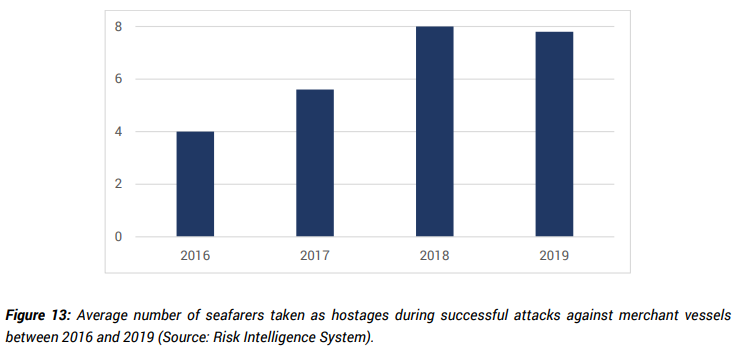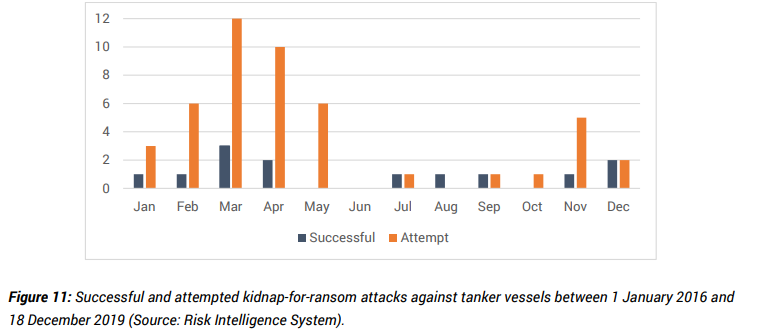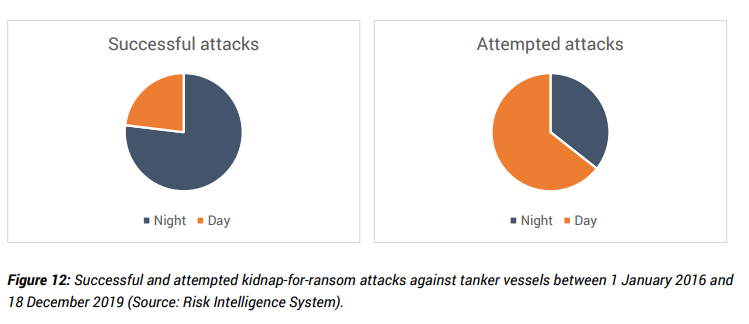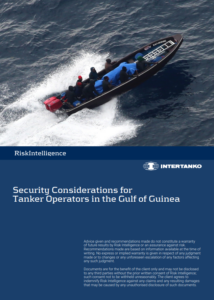In line with a growing concern over the continued attacks against ships in the Gulf of Guinea, Risk Intelligence has recorded almost 100 maritime security incidents across the region in 2019 to date, around one third of those involved tanker vessels of all types.
Three major attacks in the Gulf of Guinea in December 2019 underlined the significant threat level for tanker operations in the region. The perpetrators escaped with 19, 20 and 8 hostages respectively. In November 2019, crew members from three different ships were also kidnapped.
Based on a broad range of sources, Risk Intelligence has collected between 80 and 140 reports per year in West Africa since 2007.
Threat levels vary across the region. Violent attacks, particularly those aimed at kidnapping crew members for financial reward, are largely concentrated on areas in geographic proximity to the Niger Delta, even though neighbouring countries are affected, a new publication by Risk Intelligence and Intertanko reveals.
Whilst naval forces in Nigeria – and other countries in the region – are being enhanced, kidnap-for-ransom attacks are very likely to remain a threat for operations in the Gulf of Guinea in the next 12 to 24 months.

Key trends and figures
- Niger Delta-based groups have no preferred targets, yet tankers represent a large percentage of maritime traffic off the Niger Delta, meaning that they suffer from a high number of attacks.
- Due to low freeboard and limited speed, product tankers are particularly easy to board, but other types – including LNG tankers in ballast – have also been attacked. Overall, 60 successful or failed kidnap-for-ransom attacks against tanker vessels in the Gulf of Guinea were recorded by Risk Intelligence since January 2016.

- Once again, the figure highlights that offshore attacks are significantly more likely during the dry season in the Niger Delta, i.e. between October and March. Almost all incidents recorded during April and May took place during spells of good weather in 2016, allowing attackers to use speedboats at considerable distances from the coastline.
- Regarding the time of day, perpetrators do not have a preference for attacks during the day or at night. However, attacks at night are significantly more likely to result in the kidnapping of crew members. The overall number of attacks during the day and at night has been almost the same since 2016 yet the figure shows that the percentage of successful attacks at night is significantly higher.

This can largely be attributed to the fact that crew members are more likely to detect hostile speedboats relatively early during the day, allowing for more time to increase speed and conduct evasive manoeuvres.
- As the Nigerian government has started to increase the response capacities of military and civilian agencies, perpetrators are unlikely to be allowed much time on a ship, meaning that it is unlikely for them to have enough time to breach the citadel.
Even after a successful boarding, attackers have escaped without any hostages on several occasions in recent years when they observed an approaching naval vessel. Overall, this highlights the importance of crew vigilance even when other mitigation measures have been put in place.
- Only four seafarers were taken as hostages in successful attacks against all types of merchant ships in 2016. This number doubled for attacks in 2018 and 2019, leading to tougher and longer ransom negotiations.These can last six to eight weeks, instead of an average of two to four weeks before 2016, meaning that kidnapped seafarers have to endure a longer period of captivity in a hostage camp in the Niger Delta.
Finally, when such a high number of crew members are taken as hostages, additional dangers for the safety of the ship and the remaining crew should also be taken into consideration. Contingency plans are vital to ensure the wellbeing and safety of the seafarers remaining on board who are very likely to be deeply affected and in need of additional support.
Two implications for tanker operators
The report identifies two important implications for tanker operators:
- In the next 12 to 24 months, the current situation is unlikely to change significantly; kidnap-for-ransom attacks are very likely to remain a threat for operations in the Gulf of Guinea, especially in proximity to the Niger Delta.
- General guidance regarding mitigation measures is important, but these should be supplemented to comprehensive threat and/or risk assessments for specific vessels and voyages. Contingency plans – both on the vessel and the company level – should be assessed and updated regularly.
Recommendations
The implementation of measures contained in the “Guidelines for Owners, Operators and Masters for protection against piracy and armed robbery in the Gulf of Guinea region“, read in conjunction with the Global Counter-Piracy Guidance for Companies, Masters and Seafarers (GCPG), decreases the chance that attackers are able to board any type of vessel at sea.
Additional measures, e.g. the use of dedicated escort vessels for transits to and from Nigerian ports and terminals, should be considered, based on a thorough risk assessment that includes the current threat level, the vulnerability of a particular vessel and the potential consequences of a successful attack.

Finally, companies should also evaluate and adjust their contingency plans, instructions for masters and emergency guidelines to reduce the overall risk to crews, ships and cargoes as much as possible. The situation remains volatile and should be constantly monitored.
Explore more herebelow:
































































